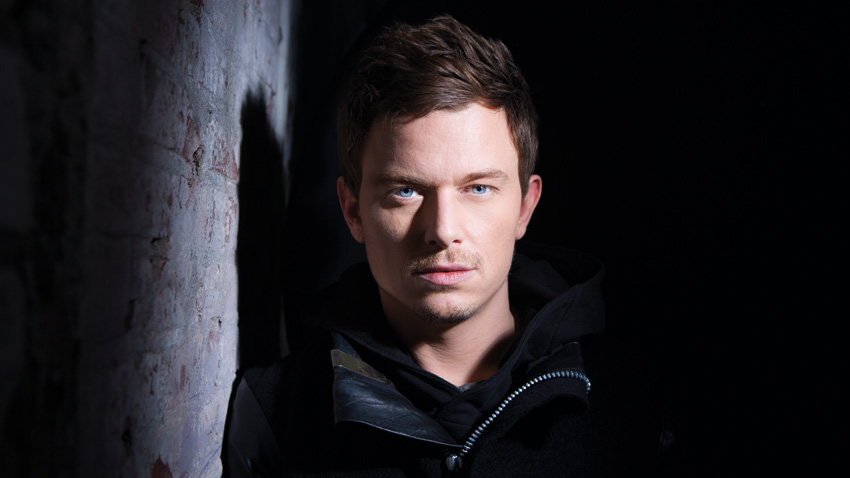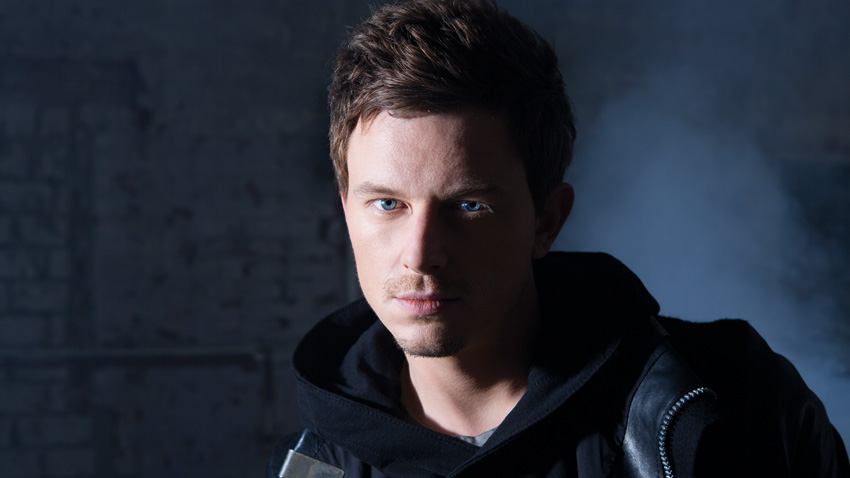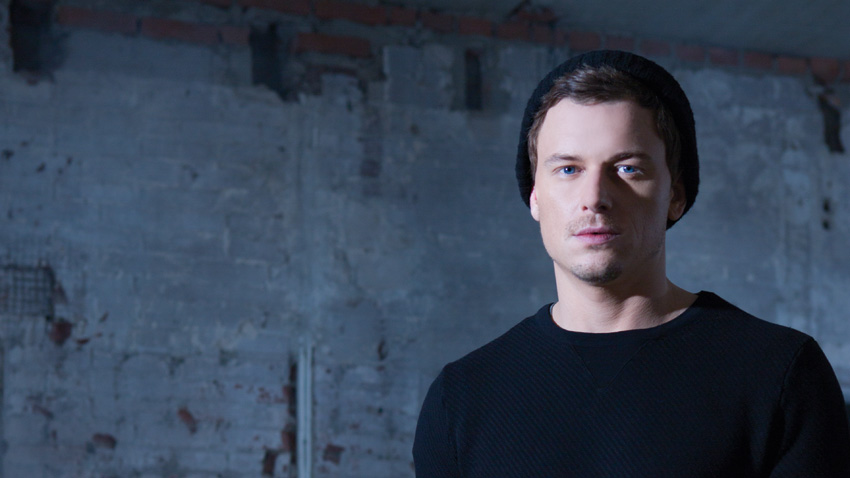Fedde Le Grand talks prog rock, remixing and Strictly Come Dancing
The Dutch house star is starting to think that simplicity isn't all it's cracked up to be. What could that mean for his remix career?

"Compared with a lot of parents, my mum and dad were pretty easygoing," says Fedde Le Grand, "but there were three rules that were non-negotiable. One: play sports. That was OK, cos I was into football. Two: learn an instrument. No problem. I was passionate about music and studied the piano for several years. Three: ballroom dancing classes - foxtrot, tango, waltz. [Laughs] I loved it and, yeah, I can still do it. Who knows… maybe I could take my music in a whole new direction!"
Before he goes all sequins and tight-trousers on us, we decide we'd better ask the Eindhoven-based DJ, producer and label boss a few more questions, and find out more about what has been a seriously successful year. As well as a string of singles with the likes of Patric La Funk, Jewelz & Sparks and Dimitri Vegas & Like Mike, he's remixed Faithless' classic anthem Insomnia and got a phone call from the States asking if he'd like to tweak Bitch I'm Madonna, by Madge and Nicki Minaj.
"That was crazy!" laughs Le Grand. "Like remixing for the FBI. I was only allowed to hear the track over the phone, then the stems were bought over personally from the US. I had three days before everything was handed back and my computer was checked to make sure every trace of the song had disappeared. It was seriously intense, but man, it forces you to be creative!"
You've mixed some pretty high-profile names over the years. Coldplay, Madonna, Michael Jackson, Mariah Carey… Do you still get nervous?
"A little bit nervous, a little bit excited. But that's the same with any remix. You're doing a job and you hope that people will appreciate your work. I've definitely noticed that there's a big difference between remixing a straight dance track and remixing a pop artist. With the dance track, I like to go somewhere completely different, but with Michael Jackson or Madonna, you have to be guided by the original much more… you have to honour it.
"But at the heart of every remix is a problem: You're taking two artists - the remixer and the artist - and you're trying to make them fit together. They weren't originally designed to fit together, but you have to make it work.
"The Coldplay remix [Paradise, back in 2011] is one that I'm very proud of. I was told the band listen to all their remixes; that certainly pushed me a little bit harder. After they heard it, they asked me to go out on tour with them, which was awesome. That's touring on a whole different level!"
Get the MusicRadar Newsletter
Want all the hottest music and gear news, reviews, deals, features and more, direct to your inbox? Sign up here.
Alongside those 'pop' remixes, your own style seems to have become a lot more song-based… Less dancefloor. Is that a criticism/comment you'd accept?
"Absolutely. The longer I do this job, the harder it is to think purely about the dancefloor. For instance, I'm working on my new artist album for next year, and the songs keep ending up as… songs. They're more musical; less simplistic. I'm not saying there's a problem with simplicity, but my heart seems to be taking me somewhere new.
"I'm working with vocalists a lot more, and I'm beginning to realise that the human voice is probably the best instrument you'll find. You can convey so much power and emotion. I guess that what I'd love to do is capture that power and that emotion and take it back to the dancefloor.
"Thankfully, we seem to be past that hard EDM thing that was happening. It kind of baffled me for a while."
"Thankfully, we seem to be past that hard EDM thing that was happening. It kind of baffled me for a while - there was so much music out there that you'd think there'd be hundreds of great new songs, too. Unfortunately, it seemed like we'd fallen into the trap of thinking that every simple idea is a good idea.
"Writing a great 'simple' song is one of the hardest things for a producer to do. To get that killer bassline and that killer hook with a great beat. That only happens very rarely. For a while, it was like a painter who was painting the same basic picture, week after week. Surely, everybody wants to develop? You can't just employ the same tricks time after time.
"If you think back to ten or 15 years ago, 30 years ago… you had really great, powerful songs appearing all the time. Great chord changes, great melodies. Songs that we still listen to today. Personally, I think that's where dance music is headed in the near future. We're heading back to the 'song'."
What did you grow up listening to? Is it true that you were a bit of prog rock kid?
"Yeah, that's true. My dad was into Pink Floyd and The Alan Parsons Project, alongside stuff like Art of Noise. My mum listened to Sting and Enya. She was also a painter and sculptor, which is where I think I got my creative drive.
"Going back to what we were talking about earlier, I did actually take up dancing for a while. I got into hip-hop and was part of a breakdancing crew; we did some pretty big performances and won a few awards."

So, there is still a chance you'll go on Strictly Come Dancing?
"What's that? Oh, the TV show? I'm still pretty good, man! I guess the breakdancing gave me a taste of how music can really move you. That led me to the idea of playing records for people, so me and a few friends started a mobile disco. I must have been about 13 or 14. Back then, a DJ was just the idiot in the corner who said, 'Hey, everybody, here's a great song. Let's get on the dancefloor.' I have to admit that I didn't say much - I was too shy.
"I managed to stick with it, though, and my parents could see I was taking it pretty seriously. By 16, I was playing at a local bar where the kids used to hang out after school on Fridays. I don't know if it's the same in the UK, but we're allowed to drink beer and wine from the age of 16 in Holland. People might say that's crazy, but maybe it's better to make your silly mistakes before you get your driving licence.
"After I discovered acid house, those Friday afternoon parties became Friday night parties, and I started to meet a few of the big-name players in the Dutch music scene. That was the first time that I really started to think that music could be my 'job'."
Making your own tunes?
"No way! I thought I was going to be a DJ. Back then, being a DJ and being a producer were very different jobs. I became a producer totally by accident. For a while, I was DJing with a live drummer and an early Roland V-Drum module. It never worked out, but I was left with this drum machine and decided to hook it up with the PC we had at home.
"The only information I could get was from magazines like Future Music, so it was a very long and slow process. I started with tracker software, hated it, moved up to Cubase and then discovered that three or four of my friends were also investigating computers and MIDI. Together, we set up our own studio with Akai samplers, one of the early Mackie digital desks, two Roland JP-8000s, a Nord Lead, a 909 emulator and… about one year later, Logic appeared. We'd spent almost €100,000 on a studio and, almost overnight, it was ready for the scrap heap. I can actually remember crying when I first saw Logic. On one hand, I was happy that the technology had moved so far, but also crying for my €100,000.
"Logic was the turning point for me… that's when it all got serious."
Was Put Your Hands Up 4 Detroit made with Logic?
"Yeah, that was purely Logic. No extra plugins. All made in my bedroom at my parents' house. I think the very first plugin I got was the Orange Vocoder, because I wanted to make a record that sounded like Daft Punk. Of course, after I bought the vocoder, somebody told me they actually used a talkbox. [Laughs] Again, I was out in the cold.
"Although I was pretty good at making music, I was never what you would call a computer nerd, so I didn't know how to download all the free software or hack the latest gear. It actually took me quite a while to start building up my studio. Nexus was one of the first synths…probably followed by Massive and Sylenth1.
"They're solid machines and I still use them today. Massive has actually got better with age: the high end is much sharper."
We've seen you praising the Sonnox Oxford plugins before - are they still your weapons of choice on the production side?
"They're great tools, but I feel they've been surpassed by what the guys are doing at FabFilter. The EQs are so transparent and you just have far more options… different ways you can approach a song. Plus, the interface is so much simpler.
"What is it with software developers? Why make the interface so complicated? Look at the Sausage Fattener. So simple, but it does the job it's supposed to do. Jewelz & Sparks are a couple of guys I've just signed to Flamingo, and I think they use it on everything."
"What is it with software developers? Why make the interface so complicated? Look at the Sausage Fattener. So simple, but it does the job it's supposed to do."
So, what's in the Le Grand mastering chain, and does it all get done at your studio?
"I will always have a go at every track myself, but sometimes there's an idea in my head and I just can't get it to sound right. I'm sure everybody has that moment… you've come up with some insane chord changes, you know it's a great song, but the final product won't go where you want it to go. That's the time when you need to send it to a mastering engineer.
"The mastering chain usually starts with a UAD 4K Buss Compressor. I try and add a little bit of punch to the mix, but not to go too far. Lately, I've been using the FabFilter Pro-Q 2 EQ, just to sort out the high end and the low mids. Again, it's all about a little touch here and a little touch there - nothing too extreme. I've also gone back to the Brainworx XL, which is good for sorting out the stereo image and getting the whole thing to sound a lot bigger.
"Then there's a tiny bit of maximising in Ozone 6 to get rid of any extreme peaks, and maybe a de-esser to take control of any harsh frequencies. I've found the de-esser can really help smooth out a mix."
Is that the lot?
"Not quite. FabFilter Pro-L sits right at the end. A touch more limiting… just in case I've missed anything. Now, I've finished!
"I know that might seem a bit extreme, but what's the point in putting together a song and ending up with something that sounds kinda shitty? Before I moved to this current studio, mastering was always a real pain in the ass. Some tracks were fine - I mastered them myself and they sounded great. Next day, I would work on another track - using some of the same sounds - and it sounded terrible. I eventually worked out it was all to do with what key the kick and the bass were in. Certain frequencies created audio madness.
"That particular studio was inside a soundproof box and we thought, 'OK, it's a soundproof box - it'll be great for a studio.' No! Just because it's soundproof does not mean it's got great acoustics. My friend Armin van Buuren put me in touch with Misha Jacobi, who is an acoustic super-nerd. He came over and said, 'Yeah, we can make this better, but the dimensions are always going to be a problem'. So, I said, 'OK, how would you build a studio?' We started looking for a space near Eindhoven and found an old furniture factory; the current studio was built from scratch and, man, it is perfect.
"Even the monitors are custom-built. They were also designed by Misha and perfectly matched with my studio. The woofer is pretty impressive… actually, it's so big and so low, it could blow your socks off. I always like to keep a pair of NS10s, just to help level off the hats, percussion and vocals, plus a set of KRK VXT8s, to cross-reference the sound when I'm working on something that needs to be really EDM… something that I know will work at a festival.
"There's a lot of love that has gone into this studio, and when I sit here, it feels like home."

Would you say that you're obsessed with sound?
"[Laughs] You're not the first person to say, 'Fedde, you've gone too far.' I know what you mean and, yeah, you're probably right to a certain extent, but I honestly think that if you want to make it in the music business, you need be a little bit obsessed. You have to be someone who lives in your head and spends all the day dreaming. If you actually stopped dreaming and looked at the reality of the music business today, you'd give up. There are so many people out there making music and so many people that want to make it… The chances of it actually happening are so slim.
"I see my brain in two parts. One part is very open, and that's the part you use to deal with real life. But the other part is completely closed off - all you can see is music-music-music - trying to create the best songs and not caring about anything else. Sure, it drives you a little bit crazy, but it's worth it."
Check out Fedde's Darklight Sessions night at ADE 2015, featuring Chocolate Puma, Housequake and Tom Swoon, plus the purpose-built Grand Cafe!


Computer Music magazine is the world’s best selling publication dedicated solely to making great music with your Mac or PC computer. Each issue it brings its lucky readers the best in cutting-edge tutorials, need-to-know, expert software reviews and even all the tools you actually need to make great music today, courtesy of our legendary CM Plugin Suite.
“I feel like that song had everything we needed to come back with”: Bring Me The Horizon’s Lee Malia on Shadow Moses, its riff and the secrets behind its tone, and why it was the right anthem at the right time
“I said, ‘Are we sure we can write a song about death?’”: The story of Mike + The Mechanics' classic No.1 The Living Years










